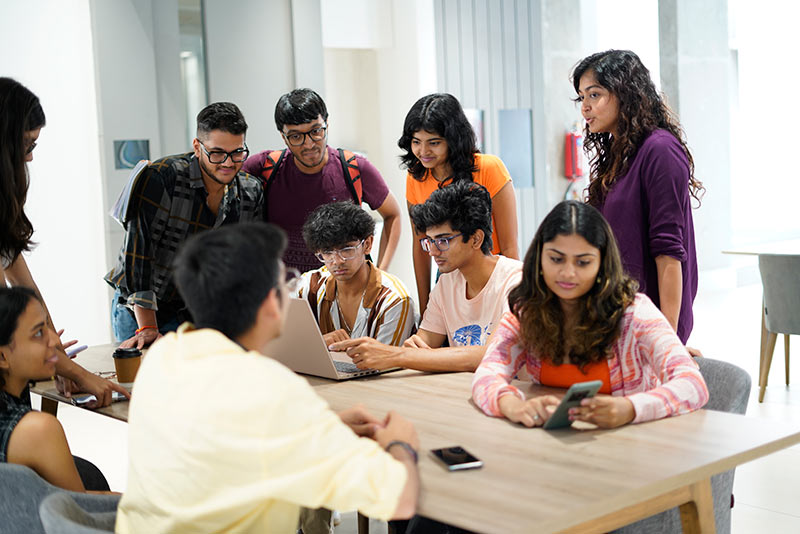VOICE OF FLAME
From Classroom to BoardRoom: How Skills Learnt at FLAME Help in the Corporate World
06 Nov 2024 | Author: Maana Shah |

From Classroom to BoardRoom: How Skills Learnt at FLAME Help in the Corporate World
Stepping into the corporate world as a fresher can often feel like venturing into the unknown. However, after spending your time at FLAME, this transition surely becomes smoother. FLAME is widely recognized as the pioneer of liberal education in the country and for its state-of-the-art infrastructure. However, what truly sets it apart is its unwavering commitment to shaping students in all aspects and equipping them to excel in the real world. While at FLAME, one does not only learn theoretical skills but also important social and technical skills. From critical thinking to time management, the curriculum and extracurricular activities at FLAME emphasize interdisciplinary learning and holistic development, preparing students to thrive in the corporate world.
Let’s delve into how the lessons at FLAME extend beyond classrooms, providing FLAME graduates with the essential skills needed to excel in their careers.
Core Foundation Courses: Building Blocks of Academic Excellence  Given the liberal education framework of the university, every student is enrolled in eight core courses. These are foundation courses that are designed to equip a student for their academic journey and to enhance their existing knowledge and skills in a real-world setting. These courses are Public Speaking, Digital Literacy, Academic Writing, Applied Ethics, Environmental Studies, Financial Literacy, Mental Models and Critical Reasoning.
Given the liberal education framework of the university, every student is enrolled in eight core courses. These are foundation courses that are designed to equip a student for their academic journey and to enhance their existing knowledge and skills in a real-world setting. These courses are Public Speaking, Digital Literacy, Academic Writing, Applied Ethics, Environmental Studies, Financial Literacy, Mental Models and Critical Reasoning.
Public speaking encourages students to become more confident, enhances networking and listening skills, and refines communication skills. This course plays a crucial role in their personal and professional growth by teaching students how to articulate their ideas effectively and present them confidently to an audience.
Similarly, the Academic Writing course enhances research proficiency and communication skills while also improving attention to detail. It introduces students to various methods and formats of writing that are necessary in both the industry and academia.
Courses on Digital and Financial Literacy are designed to teach students essential digital and financial skills in today’s evolving digital economy. These courses enhance students’ effectiveness as employees by developing their technical proficiency and cybersecurity awareness. Additionally, they encourage responsible financial habits, such as budgeting, investing, and saving, which benefit students both in the workplace and in their personal lives.
The Critical Thinking course pushes students to work on their analytical and problem-solving skills, while the Applied Ethics course focuses on developing their conflict management skills and personal ethics, contributing to the formation of a well-rounded and principled personality.
The Environmental Studies course introduces students to topics such as sustainable living and corporate social responsibility. It enables them to drive and implement sustainability initiatives and contribute to their company's social responsibility goals. Additionally, the course on mental models equips students with better decision-making skills and enhances their understanding of the world.
Curriculum and Course Structure: The How and Why of Learning
In addition to the eight foundation courses mandatory for all undergraduate students, there are various elective and degree-specific courses that students can choose to study. These courses have objectives that are aimed at guiding the student in the real world. Some of these courses are industry-relevant, regardless of the area of work.
The organizational behavior course is thoughtfully designed to emphasize the importance of effective employee and employer practices. It teaches the value of creating ideal working conditions, fostering teamwork, and enhancing communication skills. As students learn this, they are better prepared to navigate and contribute positively to organizational environments.
Similarly, the Business Ethics and Corporate Governance course is carefully crafted to educate students about workplace laws, contracts, policies, and ethical practices. This knowledge empowers them to become responsible employees who are well-versed with their rights, enabling them to manage their professional responsibilities effectively and safeguard themselves from potential exploitation. The course aims to develop self-aware individuals who can navigate the complexities of the corporate world with integrity and confidence.
Some courses incorporate group assignments that enhance teamwork and communication abilities. Students learn to work with different kinds of people, understanding different working styles and opinions. Other components might include individual presentations, case studies, application-based projects, and interactive discussions, all strategically included to build a comprehensive set of skills that are essential for personal and professional growth.
Experiential Learning Programs: Applying Theory to Real-World
"The world is your classroom, and every experience is a lesson.” ~ Unknown
Beyond the academic courses, FLAME University has embodied this ideology in its curriculum by integrating three experiential learning programs for every undergraduate student. FLAME extends teaching and learning far beyond the traditional classroom, offering students invaluable hands-on experiences.
The Developmental Activities Program (DAP) aims to increase students' awareness and sensitivity to various socio-economic issues worldwide, encouraging them to contribute as responsible citizens. Through internships at various NGOs and non-profit organizations, students develop deeper empathy for their communities and a sense of responsibility for others. This program not only raises awareness of pressing global challenges but also inspires students to actively participate in making a positive difference.
The Discover India Program is designed to immerse students in the rich culture of India and provide an enriching learning experience that goes far beyond cultural exploration. The program's structure involves students working in groups and conducting field research, offering a variety of practical learning opportunities. Throughout this process, students develop essential skills to conduct extensive research, along with budgeting, report writing, teamwork, accountability, communication, time management, planning, and responsibility. These skills are cultivated outside the traditional classroom setting, allowing students to apply them in real-world scenarios and better preparing them for future challenges.
The Summer Internship Program (SIP) provides students with a valuable opportunity to experience the realities of the professional world firsthand. By immersing themselves in the work environment, students can challenge and reshape any preconceived notions they may have about their future careers. This hands-on exposure allows them to explore various industries and roles, helping them gain practical insights into potential career paths. As a result, students gain clarity about their professional goals, strengths, and interests, which better equips them to make informed decisions about their future endeavors. The program bridges the gap between academic learning and professional application, empowering students with the confidence and skills needed to navigate the complexities of the working world.
The blend of technical and soft skills developed at FLAME University, both in the classroom and through hands-on learning experiences, prepares students with abilities to thrive in the real world. Through thoughtfully crafted courses, internships, and innovative programs, students gain the opportunity to apply theoretical knowledge in practical environments, effectively bridging the gap between education and the challenges they will face in the world.
As the saying goes, "The true test of a student is not what they know, but how they apply it in the real world." FLAME’s approach to education is rooted in this philosophy, aiming to produce graduates who are not just knowledgeable but also capable of navigating complex, real-world situations with confidence and competence. This preparation ensures that FLAME students are ready to excel in their careers and make meaningful contributions to society, fully embodying the university's commitment to nurturing future leaders who are socially responsible and globally aware.
(Author: Maana Shah , Undergraduate Student)






